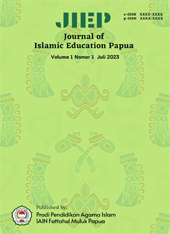Urgensi Penanaman Nilai Pendidikan Karakter Bagi Generasi Z Di Era 5.0 Dalam Perspektif Al-Quran
DOI:
https://doi.org/10.53491/jiep.v1i2.815Keywords:
Character Education, Generation Z, Era 5.0, Al-QuranAbstract
In the digital era, character education is a process that always leads to improving human character. Character education is a systematic effort to give students an understanding of the values of human behavior in relation to God, themselves, fellow humans, the environment and the state. The aim of national education is to make students become individuals who believe and are devoted to God Almighty, have noble character, are healthy, knowledgeable, creative, independent and dignified. To help Gen Z face the current Era 5.0, the aim of this article is to provide character education from the perspective of the Koran. Library research solves problems. This data is collected from various sources. primary and secondary data, along with supporting data. The current data is analyzed using the hermeneutic method through analysis. The results of this research show that character education contributes to quality personality development, facing social and technological changes, as well as the application of ethical and moral values in everyday life. Strategies to foster character education such as habituation, role modeling and technology-based education must also be implemented. Therefore, character education in Era 5.0 with an insight into the Koran can form a generation that is qualified and resilient to face the challenges of the times.
Downloads
References
Ahmadi. (2013). Menejemen Kurikulum Pendidikan Kecakapan. Pustaka Ifada.
Ainiyah, N. (2013). Pembentukan Karakter melalui Pendidikan Agama Islam. Al -Ulum, 13 Nomor 1, 25–38.
Alfikri, A. W. (2023). Peran Pendidikan Karakter Generasi Z dalam Menghadapi Tantangan Di Era Society 5 . 0. Prosiding Seminar Nasional Pascasarjana Universitas Negeri Semarang, 22.
Awulloh, Abdul Latifah, Khofiyati A’fifah, Nur Huda, M. K. (2021). Urgensi Pendidikan Karakter Dalam Menghadapi Era Society 5 . 0 Study. Prosiding Dan Web Seminar (Webinar), 348–353.
Bisri, M. (1959). Tafsir al-Ibriz. Menara Kudus.
Di, S., Society, E. R. A., Hidayat, T., Pohan, W., Ihsan, F., & Hasibuan, A. (2022). Pendidikan Islam Dalam Membentuk Karakter Sosial. 2(2), 1–11.
Fitri, A. (2018). Pendidikan Karakter Prespektif Al-Quran Hadits. TA’LIM : Jurnal Studi Pendidikan Islam, 1(2), 258–287. https://doi.org/10.52166/talim.v1i2.952
Handayani, N. M. A. P., Putri, P. W., Juniantari, N. made R., & Prof.Dr.Ir. I ketut Arnawa, M. (2010). Pentingnya Pendidikan Karakter DI Era SOCIETY 5.0 Bagi Generasi Z Untuk Memajukan Bangsa. 1(d), 435–459.
Jonathan Sarwono. (2012). Metode Penelitian Kuantitatif Dan Kualitatif. Graha Ilmu.
Kamarudin, & Djafri, N. (2023). Urgensi Pendidikan Karakter pada Era Society 5.0. Jurnal Ilmiah Multidisiplin, 2(1), 17–23. https://jurnal.aksarakawanua.com
Khusairi, H., Alamin, N., Yusuf, M., & Putri, L. A. (2022). Contextualization of Character Education Perspective of The Qur’an. Millennial : Jurnal Pendidikan Dan Studi Islam, 2(2), 26.
Mawangir, M. (2018). Nilai-Nilai Pendidikan Karakter Perspektif Tafsir Al-Mishbah Karya Muhammad Quraish Shihab. Tadrib: Jurnal Pendidikan Agama Islam, 4(1), 163–182. https://doi.org/10.19109/tadrib.v4i1.1917
Shihab, M. Q. (2011). Tafsir Al-Misbah, Pesan, Kesan, dan Keserasian Al-Qur’an (Vol. 3). Lentera Hati.
Sidik, F. (2020). Pemikiran Bisri Mustofa Tentang Nilai Pendidikan Karakter (Kajian Surat Al-Hujurat Ayat 11-15 Tafsir Al-Ibriz). Tawazun: Jurnal Pendidikan Islam, 13(1), 42. https://doi.org/10.32832/tawazun.v13i1.2980
Solihin, A., Wahid, H. A., & Fikri, A. (2023). Pendidikan Karakater Dalam Perspektif Al-Qur’an Dan Hadist. Jurnal Multidisiplin Indonesia, 2(7), 1397–1408. https://doi.org/10.58344/jmi.v2i7.298
Tarigan, P. B. (2018). Pendidikan Karakter Dalam Al Qur’an Pada Kalangan Remaja Di Era Digital. Journal of Chemical Information and Modeling, 53(9), 1689–1699.
Yunita, Y., & Mujib, A. (2021). Pendidikan Karakter Dalam Perspektif Islam. Jurnal TAUJIH, 14(01), 78–90. https://doi.org/10.53649/jutau.v14i01.309.
Downloads
Published
Issue
Section
License
Copyright (c) 2024 Achmad Nasrul Chaq, Afif Syaiful Mahmudin

This work is licensed under a Creative Commons Attribution 4.0 International License.






